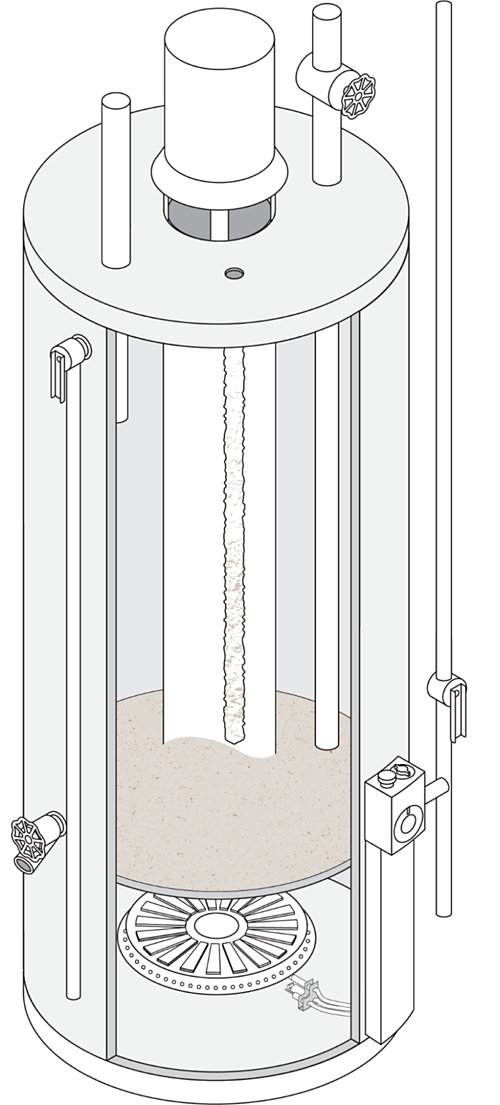A hissing water heater can be dangerous. It may indicate a pressure build-up or a leak, posing risks of explosion or scalding.
Water heaters are vital for modern homes, providing hot water for various needs. A hissing sound often raises concerns among homeowners. This noise can signal underlying issues that require immediate attention. Ignoring these sounds can lead to serious safety hazards.
Regular maintenance helps identify potential problems early. Homeowners should stay alert to unusual noises, as they often indicate malfunctioning components. Understanding the implications of a hissing water heater is crucial for safety. Prompt action can prevent costly repairs and protect your home. Always consult a professional if you notice unusual sounds coming from your water heater. Safety should always be the top priority.

Credit: www.theplumberguy.com
Page Contents
- 1 The Unsettling Sound: Hissing In Water Heaters
- 2 Danger Levels: When To Worry
- 3 Quick Fixes For Minor Issues
- 4 Professional Intervention: When To Call
- 5 Preventive Measures: Ensuring Safety
- 6 Understanding The Risks: Pressure Build-up
- 7 Do-it-yourself Vs. Professional Help
- 8 Future Innovations: Safer Water Heaters
- 9 Frequently Asked Questions
- 10 Conclusion
The Unsettling Sound: Hissing In Water Heaters
A hissing sound from a water heater can be alarming. This noise often indicates trapped air or steam. It may also signal sediment buildup in the tank. Overheating can create pressure and lead to hissing. Always check for leaks around the heater too.
Immediate actions are important. First, turn off the heater to prevent damage. Then, check the temperature settings. Make sure they are not too high. If the hissing continues, it’s wise to call a professional. They can inspect the unit safely. Ignoring the sound may lead to more serious problems.
Danger Levels: When To Worry
Hissing sounds from a water heater can mean trouble. This noise may indicate steam escaping or pressure issues. Pay attention to any leaks or foul smells. These signs can suggest a serious problem that requires immediate attention.
Some common myths about hissing water heaters include:
- Myth: Hissing is normal.
- Fact: Hissing often signals a malfunction.
- Myth: Water heaters last forever.
- Fact: Regular maintenance is crucial for longevity.
Don’t ignore these signs. Acting quickly can prevent more serious damage. Always consult a professional if unsure.
Quick Fixes For Minor Issues
Adjusting the temperature of your water heater can help prevent hissing sounds. Set the thermostat to a safe level, usually around 120°F. This helps keep water hot without causing pressure issues.
Sediment buildup can lead to strange noises. Regularly flushing the tank removes debris. To flush, turn off the heater and let it cool. Connect a hose to the drain valve and let the water flow out.
After the tank empties, turn on the cold water supply. This will help dislodge any remaining sediment. Let it run for a few minutes before shutting off.

Credit: www.reddit.com
Professional Intervention: When To Call
A hissing water heater can be a sign of trouble. This noise often indicates a build-up of pressure or steam. Both situations can lead to serious issues. Knowing when to call a professional is vital.
Signs you need help include:
- Continuous hissing sounds
- Water pooling around the heater
- Unusual temperature fluctuations
Choosing the right service is also important. Look for a licensed technician. Check for positive customer reviews. Ensure they have experience with your type of water heater.
Preventive Measures: Ensuring Safety
Regular checks on your water heater are essential for safety. Look for signs of wear and tear. Ensure all connections are tight and secure. Inspect the pressure relief valve often. Flush the tank yearly to remove sediment build-up.
Water quality plays a significant role in your heater’s lifespan. Hard water can lead to mineral deposits. These deposits can cause hissing noises and reduce efficiency. Testing your water can help identify issues early.
Consider using a water softener if hard water is a problem. This can protect your heater and improve water quality. Always keep an eye on changes in water temperature and pressure.
Understanding The Risks: Pressure Build-up
Early detection of a hissing water heater is crucial for safety. Look for unusual noises as they may signal problems. A hissing sound often indicates pressure build-up. This can lead to serious issues if not addressed.
Check for water leaks or steam around the heater. These signs may suggest high pressure. Safety valves play a key role in preventing disasters. They release excess pressure to keep the system safe.
Regular maintenance helps ensure valves work properly. Always consult a professional for any repairs. Ignoring these signs can lead to dangerous situations.
Do-it-yourself Vs. Professional Help
Choosing between DIY and professional help can be tough. Each option has its own pros and cons.
Pros of DIY: Saves money, gives a sense of accomplishment, and allows flexibility. Cons of DIY: Can lead to dangerous situations, requires time, and may cause more damage.
Pros of Professional Help: Offers expertise, ensures safety, and saves time. Cons of Professional Help: Can be expensive and may require scheduling.
| Aspect | DIY | Professional Help |
|---|---|---|
| Cost | Lower | Higher |
| Safety | Risky | Safer |
| Time | Variable | Less |
DIY projects can become dangerous quickly. Lack of experience may lead to accidents. Proper tools and knowledge are essential for safety.

Credit: redcapnow.com
Future Innovations: Safer Water Heaters
Safer water heaters are coming soon. Technological advancements will improve safety features. New designs will focus on reducing risks.
Consumers can expect smart water heaters. These devices can alert users about issues. They will monitor temperature and pressure automatically.
Another innovation is leak detection systems. These systems will shut off water automatically. This feature can prevent significant water damage.
Water heaters will also have better insulation. This will help maintain heat and save energy. Lower energy bills are a big plus for consumers.
Lastly, user-friendly interfaces will be standard. They will allow easy monitoring and control. This makes managing water heaters simple and safe.
Frequently Asked Questions
Is It Normal For A Water Heater To Hiss?
Yes, it’s normal for a water heater to hiss occasionally. This sound often results from sediment buildup or steam escaping. Regular maintenance can help reduce these noises. If hissing persists, consult a professional to ensure your water heater operates safely and efficiently.
How Do I Know If My Water Heater Is Dangerous?
Signs of a dangerous water heater include unusual noises, leaks, rust, or discolored water. Check for a strong gas smell or excessive heat. Regular maintenance helps prevent issues. If you notice any of these signs, contact a professional immediately for inspection and repairs.
Safety should always be your priority.
Is It Normal For Heater To Make Hissing Sound?
Yes, it can be normal for a heater to make a hissing sound. This noise often indicates the expansion of metal components or the movement of air and steam. If the sound persists or worsens, consult a professional to ensure safe operation.
Is A Sizzling Sound Dangerous On A Water Heater?
A sizzling sound from a water heater can indicate a problem. It may signal sediment buildup or overheating. Both issues can lead to leaks or damage. Regular maintenance is essential to prevent potential hazards. If you hear this sound, consider contacting a professional for inspection and repairs.
Conclusion
A hissing water heater can signal potential issues that require immediate attention. Ignoring this sound may lead to leaks or even dangerous situations. Regular maintenance is essential for safety and efficiency. Always consult a professional if you’re uncertain. Stay informed to ensure your home remains safe and comfortable.
